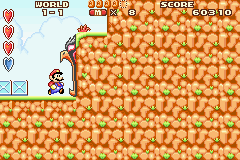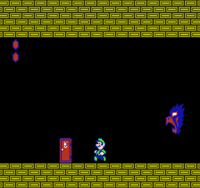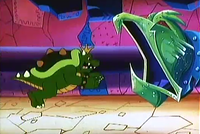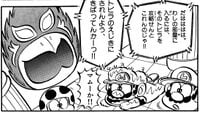Mask Gate
- Not to be confused with Birdfish.

Mask Gates,[1][2][3] also known as masks[4] and Birdfaces,[5] are eagle-head gates that appear at the end of every level in Super Mario Bros. 2, its reissues in Super Mario All-Stars and Super Mario Advance, and its original version, Yume Kōjō: Doki Doki Panic.
History
Yume Kōjō: Doki Doki Panic / Super Mario Bros. 2
Mask Gates first appear in Yume Kōjō: Doki Doki Panic, where they resemble a tribal mask instead of a bird head. They are reminiscent to Phanto or the smaller masks that were replaced by Mushroom Blocks. Its design was altered to that of a bird's in its overseas localization, Super Mario Bros. 2.
In both games, Mask Gates are attached to the wall at the end of a level. A Mask Gate allows the player to move on to the next level, or to the world's boss if the current level is the last level of the world. To open a Mask Gate, the player must pick up a Crystal Ball, which is either placed out in the open or guarded by Birdo.
All Mask Gates are harmless to the player, except for one, which appears in Wart's Castle, more specifically World 7-2. By picking up the Crystal Ball, the Mask Gate detaches itself from the wall and then chases the player around in a similar manner to Phanto. It takes away a small heart from the player upon contact. The player must attack the Mask Gate by throwing Mushroom Blocks (masks in Yume Kōjō: Doki Doki Panic) in the vicinity; after the player throws three Mushroom Blocks at it, the Mask Gate is temporarily stunned, allowing entry into Wart's throne room. However, if the player does not enter into the Mask Gate while it is stunned, it eventually reanimates itself and resumes attacking, forcing the player to throw three more Mushroom Blocks at it.
The Super Mario Bros. Super Show!
What appears to be a Mask Gate appears in the episode "Too Hot to Handle" of The Super Mario Bros. Super Show! Although King Koopa leaps into the Mask Gate at the climax of the episode to make his getaway, it appears to be inanimate and is made of metal.
Nintendo Comics System
It has been requested that this section be rewritten and expanded to include more information. Reason: Detail individual appearances
Mask Gates made several appearances in the Nintendo Comics System's Super Mario Bros. comics, functioning much like Warp Pipes.
Super Mario-kun
A Mask Gate appears in volume 8 of Super Mario-kun. This Mask Gate is similar to the one near Wart's Castle because it starts attacking when Mario tries to enter through it. As in the games, Mario throws a Mushroom Block to have it allow him, Luigi, and Yoshi to enter Wart's Castle.
Profiles
Encyclopedia Super Mario Bros.
- Enemy bio: 入ると別の部屋へ移動するゲート。一度だけ、敵として襲ってくることがある。[6] (A gate that moves you to another room when you enter. They will attack you as an enemy only once.)
- Object bio: 水晶を取ると口が開く。入ればコースクリアとなる。[7] (Pick up the crystal and its mouth opens. Once you enter, the course will be clear.)
Gallery
Super Mario Maze Picture Book 6: Take Down Wart
Names in other languages
| Language | Name | Meaning | Notes |
|---|---|---|---|
| Chinese (simplified) | 老鹰嘴通道[8] Lǎoyīng Zuǐ Tōngdào |
Eagle Beak Passageway | |
| German | Falkentor[?] | Falcon Gate | |
| Italian | Testa di Falco[12] | Falcon's Head |
References
- ^ Super Mario Bros. 2 Inside Out, Part I. Pages 8 and 34.
- ^ Super Mario Bros. 2 Inside Out, Part II. Page 32.
- ^ M. Arakawa. NES Game Atlas. Page 27.
- ^ "At the end of each area, there is a mask that becomes a gate to the next area." - Super Mario Bros. 2 NES instruction booklet, page 22.
- ^ Nintendo Power Advance V.1, page 39.
- ^ Shogakukan. 2015. Super Mario Bros. Hyakka: Nintendo Kōshiki Guidebook, Super Mario USA section, page 68.
- ^ Shogakukan. 2015. Super Mario Bros. Hyakka: Nintendo Kōshiki Guidebook, Super Mario USA section, page 70.
- ^ iQue's promotional demo play videos of Super Mario Advance and Wario Land 4. Retrieved September 4, 2020.
- ^ Yume Kōjō: Doki Doki Panic instruction booklet, page 28.
- ^ Shogakukan. 「スーパーマリオコレクション任天堂公式ガイドブック」 (Super Mario Collection Nintendo Kōshiki Guidebook). Page 154.
- ^ Perfect Ban Mario Character Daijiten, page 225.
- ^ Super Mario Bros. Enciclopedia; page 70







